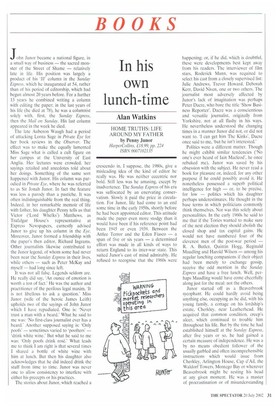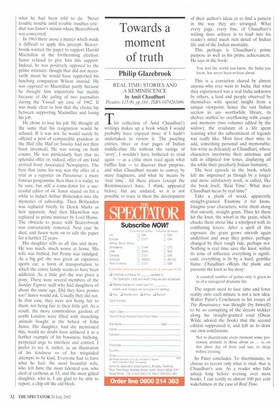In his own lunch-time
Alan Watkins
HOME TRUTHS: LIFE AROUND MY FATHER by Penny Junor HalperCollins, £18.99, pp. 224
ISBN 0007102135
John Junor became a national figure, in a small way of business — the sacred monster of the Street of Shame — relatively late in life. His position was largely a product of his 'Jr column in the Sunday Express, which he inaugurated at 54, rather than of his period of editorship, which had begun almost 20 years before. For a further 13 years he combined writing a column with editing the paper; in the last years of his life (he died at 78), he was a columnist solely with, first, the Sunday Express, then the Mail on Sunday. His last column appeared in the week he died.
The late Auberon Waugh had a period of attacking Lorna Sage in Private Eye for her book reviews in the Observer. The effect was to make the equally lamented Miss Sage what is called a cult figure on her campus at the University of East Anglia. Her lectures were crowded, her sayings retailed and anecdotes told about her doings. Something of the same sort happened with Junor. His column was parodied in Private Eye, where he was referred to as Sir Jonah lunar. In fact the feature was less a parody than a pastiche. It was often indistinguishable from the real thing. Indeed, in her remarkable memoir of life with father, his daughter Penny tells us that Victor (`Lord Whelks') Matthews, as Trafalgar House's representative at Express Newspapers, earnestly advised Junor to give up his column in the Eve. Moreover, Junor formed a friendship with the paper's then editor, Richard lngrams. Other journalists likewise contributed to the Junor legend, of whom some had never been near the Sunday Express in their lives, while others — such as Peter McKay and myself — had long since left.
It was not all false. Legends seldom are. He really did say, An ounce of emotion is worth a ton of fact.' He was the author and practitioner of the perilous legal maxim, It is not libellous to ask a question.' Miss Junor (wife of the heroic James Leith) upholds two of the sayings of John Junor which I have repudiated. One is: 'Never trust a man with a beard.' What he said to me was: 'No first-class journalist ever has a beard.' Another supposed saying is: 'Only poofs' — sometimes varied to `poofters' — 'drink white wine.' But what he said to me was: 'Only poofs drink rosé.' What leads me to think I am right is that several times I shared a bottle of white wine with him at lunch. But then his daughter also acknowledges that he did indeed drink the stuff from time to time. Junor was never one to allow consistency to interfere with either his precepts or his practices.
The stories about Junor, which reached a crescendo in, I suppose, the 1980s, give a misleading idea of the kind of editor he really was. He was neither eccentric nor bold. Still less was he amusing, except by inadvertence. The Sunday Express of his era was suffocated by an enervating conservatism. Slowly it paid the price in circulation. For Junor, life had come to an end some time in the early 1950s, shortly before he had been appointed editor. This attitude made the paper even more stodgy than it would have been if his reference point had been 1945 or even 1939. Between the Attlee Terror and the Eden Fiasco — a span of five or six years — a determined effort was made in all kinds of ways to return England to its inter-war state. This suited Junor's cast of mind admirably. He refused to recognise that the 1960s were happening; or, if he did, which is doubtful, these were developments best kept away from his readers. The interviewer of film stars, Roderick Mann, was required to select his cast from a closely supervised list: Julie Andrews, Trevor Howard, Deborah Kerr, David Niven, one or two others. The journalist most adversely affected by Junor's lack of imagination was perhaps Peter Dacre, who bore the tide 'Show Business Reporter'. Dacre was a conscientious and versatile journalist, originally from Yorkshire, not at all flashy in his ways. He nevertheless understood the changing times in a manner Junor did not, or did not want to. 'I can get him The Kinks', Dacre once said to me, 'but he isn't interested.'
Politics were a different matter. Though he might exhibit similar tendencies (No one's ever heard of lain Macleod', he once rebuked me), Junor was saved by his obsession with the subject. He never read a book for pleasure or, indeed, for any other purpose if he could possibly avoid it. He nonetheless possessed a superb political intelligence for high — or, to be precise, for low — politics which his daughter perhaps underestimates. He thought in the base terms in which politicians commonly think themselves. Nor was this solely about personalities. In the early 1960s he said to me that if the Tories wanted to make sure of the next election they should abolish the closed shop and tax capital gains. He would not have numbered four of the cleverest men of the post-war period — R. A. Butler, Ouintin Hogg, Reginald Maudling and Harold Wilson — among his regular lunching companions if their object had been merely to exchange gossip, receive the odd mention in the Sunday Express and have a free lunch. Well, perhaps Maudling would have come cheerfully along just for the meal: not the others.
Junor started off as a Beaverbrook sycophant. He could hardly avoid being anything else, occupying as he did, with his young family, a cottage on his lordship's estate, Cherkley, near Leatherhead. He acquired that common condition, creep's ulcer, which continued to trouble him throughout his life. But by the time he had established himself at the Sunday Express, after five years or so. he had gained a certain measure of independence. He was a by no means obedient follower of the usually garbled and often incomprehensible instructions which would issue from Cherkley, Arlington House, Cap d'Ail, the Waldorf Towers, Montego Bay or wherever Beaverbrook might be resting his head at any given moment. He was a master of procrastination or of misunderstanding what he had been told to do. 'Never trouble trouble until trouble troubles you': that was Junor's maxim where Beaverbrook was concerned.
In 1963 there arose a matter which made it difficult to apply this precept. Beaverbrook wanted the paper to support Harold Macmillan at the forthcoming election. Junor refused to give him this support. Indeed, he was positively opposed to the prime minister, though that did not necessarily mean he would have supported his lunching companion Wilson instead. He was opposed to Macmillan partly because he thought him unpatriotic but mainly because of the jailing of two journalists during the Vassall spy case of 1962. It was made clear to him that the choice lay between supporting Macmillan and losing his job.
He chose to lose his job. He thought all the same that his resignation would be refused. If it was not, he would surely be offered a post of comparable grandeur at the Mail (the Mail on Sunday had not then been invented). He was wrong on both counts. He was particularly hurt that no splendid offer or, indeed, offer of any kind arrived from Associated Newspapers. The best that came his way was the offer of a trial as a reporter on Panorama: a more famous programme then than it is today, to be sure, but still a come-down for a successful editor of 44. Junor stayed on for a while to induct Arthur Brittenden into the mysteries of editorship. Then Brittenden was replaced briefly by Derek Marks as heir apparent. And then Macmillan was replaced as prime minister by Lord Home. The obstacle to peace with Beaverbrook was conveniently removed. Next year he died, and Junor went on to edit the paper for a further 22 years.
His daughter tells us all this and more. He was much, much worse at home. His wife was bullied, but Penny was indulged. As a big girl she was given an expensive sports car, a form of transportation to which the entire family seems to have been addicted. As a little girl she was given a pony. There were several members of the Sunday Express staff who had daughters of about the same age. Did they have ponies too? Junor would ask. Usually they did not. In that case, they were not being fair to them; not being fair to their little girl. As a result, the more commodious gardens of north London were filled with munching animals bought at the behest of John Junor. His daughter, had she mentioned this, would no doubt have adduced it as a further example of his bossiness, bullying, perpetual urge to interfere and control. I prefer to see it, rather, as an illustration of his kindness or of his misguided attempts to be kind. Everyone had to have what he had: the most beautiful wife, who left him; the most talented son, who died of cirrhosis at 53; and the most gifted daughter, who is, I am glad to be able to report, a chip off the old block.



























































 Previous page
Previous page